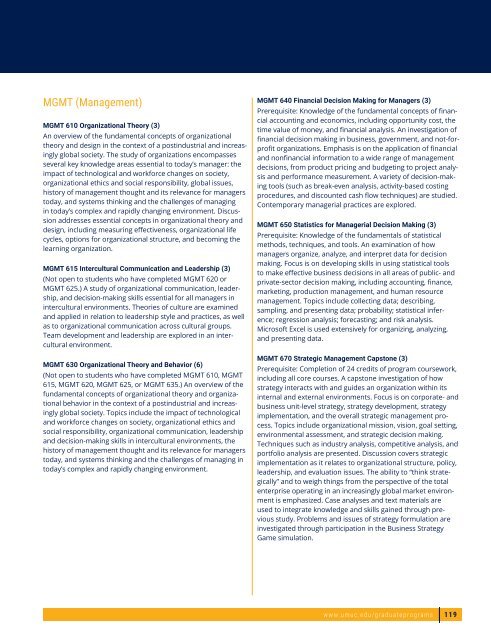2016–2017 2016–2017
2016-2017-graduate-catalog
2016-2017-graduate-catalog
Create successful ePaper yourself
Turn your PDF publications into a flip-book with our unique Google optimized e-Paper software.
MGMT (Management)<br />
MGMT 610 Organizational Theory (3)<br />
An overview of the fundamental concepts of organizational<br />
theory and design in the context of a postindustrial and increasingly<br />
global society. The study of organizations encompasses<br />
several key knowledge areas essential to today’s manager: the<br />
impact of technological and workforce changes on society,<br />
organizational ethics and social responsibility, global issues,<br />
history of management thought and its relevance for managers<br />
today, and systems thinking and the challenges of managing<br />
in today’s complex and rapidly changing environment. Discussion<br />
addresses essential concepts in organizational theory and<br />
design, including measuring effectiveness, organizational life<br />
cycles, options for organizational structure, and becoming the<br />
learning organization.<br />
MGMT 615 Intercultural Communication and Leadership (3)<br />
(Not open to students who have completed MGMT 620 or<br />
MGMT 625.) A study of organizational communication, leadership,<br />
and decision-making skills essential for all managers in<br />
intercultural environments. Theories of culture are examined<br />
and applied in relation to leadership style and practices, as well<br />
as to organizational communication across cultural groups.<br />
Team development and leadership are explored in an intercultural<br />
environment.<br />
MGMT 630 Organizational Theory and Behavior (6)<br />
(Not open to students who have completed MGMT 610, MGMT<br />
615, MGMT 620, MGMT 625, or MGMT 635.) An overview of the<br />
fundamental concepts of organizational theory and organizational<br />
behavior in the context of a postindustrial and increasingly<br />
global society. Topics include the impact of technological<br />
and workforce changes on society, organizational ethics and<br />
social responsibility, organizational communication, leadership<br />
and decision-making skills in intercultural environments, the<br />
history of management thought and its relevance for managers<br />
today, and systems thinking and the challenges of managing in<br />
today’s complex and rapidly changing environment.<br />
MGMT 640 Financial Decision Making for Managers (3)<br />
Prerequisite: Knowledge of the fundamental concepts of financial<br />
accounting and economics, including opportunity cost, the<br />
time value of money, and financial analysis. An investigation of<br />
financial decision making in business, government, and not-forprofit<br />
organizations. Emphasis is on the application of financial<br />
and nonfinancial information to a wide range of management<br />
decisions, from product pricing and budgeting to project analysis<br />
and performance measurement. A variety of decision-making<br />
tools (such as break-even analysis, activity-based costing<br />
procedures, and discounted cash flow techniques) are studied.<br />
Contemporary managerial practices are explored.<br />
MGMT 650 Statistics for Managerial Decision Making (3)<br />
Prerequisite: Knowledge of the fundamentals of statistical<br />
methods, techniques, and tools. An examination of how<br />
managers organize, analyze, and interpret data for decision<br />
making. Focus is on developing skills in using statistical tools<br />
to make effective business decisions in all areas of public- and<br />
private-sector decision making, including accounting, finance,<br />
marketing, production management, and human resource<br />
management. Topics include collecting data; describing,<br />
sampling, and presenting data; probability; statistical inference;<br />
regression analysis; forecasting; and risk analysis.<br />
Microsoft Excel is used extensively for organizing, analyzing,<br />
and presenting data.<br />
MGMT 670 Strategic Management Capstone (3)<br />
Prerequisite: Completion of 24 credits of program coursework,<br />
including all core courses. A capstone investigation of how<br />
strategy interacts with and guides an organization within its<br />
internal and external environments. Focus is on corporate- and<br />
business unit-level strategy, strategy development, strategy<br />
implementation, and the overall strategic management process.<br />
Topics include organizational mission, vision, goal setting,<br />
environmental assessment, and strategic decision making.<br />
Techniques such as industry analysis, competitive analysis, and<br />
portfolio analysis are presented. Discussion covers strategic<br />
implementation as it relates to organizational structure, policy,<br />
leadership, and evaluation issues. The ability to “think strategically”<br />
and to weigh things from the perspective of the total<br />
enterprise operating in an increasingly global market environment<br />
is emphasized. Case analyses and text materials are<br />
used to integrate knowledge and skills gained through previous<br />
study. Problems and issues of strategy formulation are<br />
investigated through participation in the Business Strategy<br />
Game simulation.<br />
www.umuc.edu/graduateprograms 119


